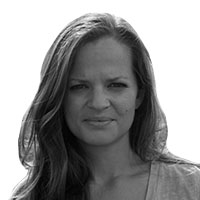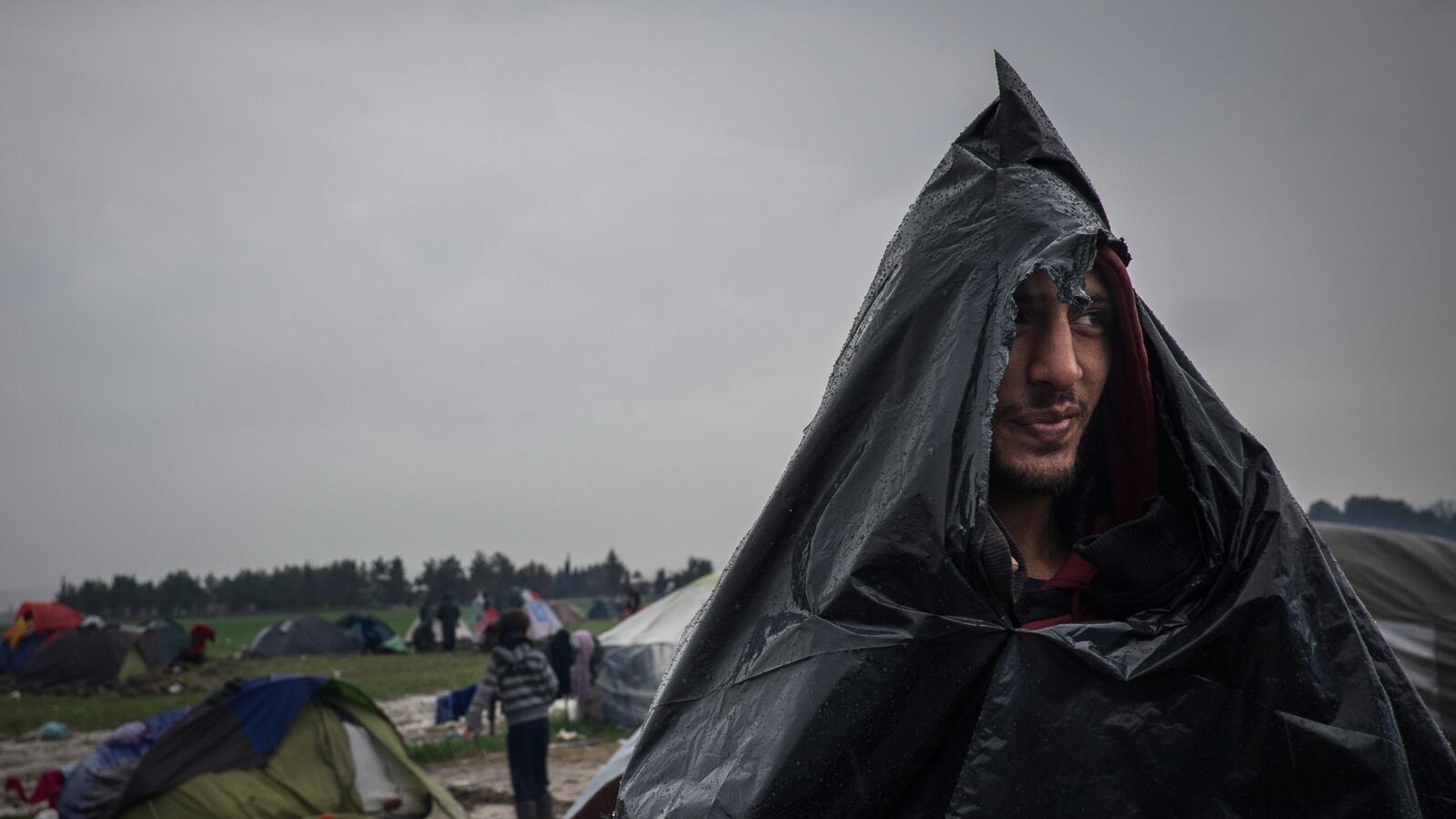IDOMENI, Greece — Hussam appeared to be slipping through the final crack of a swiftly closing door on Friday when Macedonian police finally allowed him into the no-man’s land at the border with Greece.
A young Syrian who lived in the Yarmouk refugee camp, Hussam survived years of a devastating siege before escaping to Lebanon, and finally trying to make his way to Europe. After 10 days of waiting in this muddy, desperate encampment on Macedonia’s frontier, he was on the verge of finally continuing his journey north.
The police made him wait two days in no-man’s land before finally summoning him, in the early hours of Monday, to examine his ID. The officer took one look at it, and pointed to the line that said in Arabic: “Place of birth: Damascus.”
In the latest version of the ever-tightening criteria that had steadily whittled down the number of people deemed worthy to cross the border, officials decided that certain areas in Syria and Iraq—including Damascus—were safe, their residents not in need of international protection.
And just like that, Hussam’s dream of reaching the safety of Germany seemed to be over. “Get out!” said the officer, ushering Hussam back into the camp where around 12,000 refugees were waiting.
The gate into Macedonia slammed shut and may not open again. With Slovenia’s announcement Tuesday evening that it would no longer allow refugees passage through its borders to reach Austria or Germany, the route used by the majority of the more than a million refugees who made their way to Europe last year appears to be effectively closed. Croatia, Serbia, and Macedonia quickly announced they would follow Slovenia’s lead.
Many refugees, their way forward blocked, their futures now uncertain, don’t know where to turn. Hussam, a 25-year-old with shoulder-length curly hair, was at a loss for what to do next. “I feel like I should go back to the sea and throw myself in,” he said. “They killed our hope.”
The border closures come days after European Union and Turkish leaders agreed on the framework of a deal they say will stop the flow of refugees into Greece. In a statement issued by EU heads of state after the summit, they declared that “irregular flows of migrants along the western Balkans route have now come to an end.”
But more than 1,300 refugees and migrants continue to arrive on Greek islands every day, and more than 36,000 refugees are now stuck in the country. Those in Idomeni are skeptical about an EU relocation plan that officials are encouraging them to apply for.
A spokeswoman for Macedonia’s Interior Ministry said Wednesday that Macedonia’s border would remain shut to refugees if other countries along the route did not open theirs. Nearly 1,500 refugees are stuck on Macedonia’s northern border with Serbia, where border guards have denied them entry.
It’s unclear how long refugees will cling to hope that the border may reopen, and stay in Idomeni. Conditions are difficult, and around 62 percent of the people here are women and children, according to Babar Baloch, spokesman for the United Nation’s Refugee Agency in Idomeni.
Greece says it’s planning to build nine new shelters for refugees, but people will be reluctant to move without clear information, said Baloch. “There’s no clear sense, in terms of flow of information from the authorities on any side, of what’s going to happen to them,” he said.
Wednesday morning, Hussam and several friends tried to ward off the damp cold by lighting a fire in a pit dug in the mud outside their tents. Hussam’s hands bear wounds from foraging firewood in nearby forests, but the wood was wet from overnight rain and stubbornly refused to catch fire as they used plastic and clothing—all that was available—for kindling.
Hussam says that during the siege of Yarmouk, he helped friends who were doctors provide medical care for starving residents. A musician, he and friends put on concerts to provide cheer in a situation so grim that residents were eating dogs, cats, and soup made of boiled tree bark. He posted videos on YouTube, he says, to show the world what was happening in the camp. When he finally escaped, he immediately left for Lebanon; his friends who stayed in Damascus were arrested a week later. He hopes to finish his law degree in Germany—if he can get there.
For many of the refugees, the thought of turning around and heading back at this point is too hard to bear after everything they’ve given up to reach this point. “No one knows what each family here has lost or sold in order to be here—everyone has an enormous story,” says Hussam, gesturing at the vast expanse of tents.
Officials in the camp were handing out flyers for the EU relocation plan, which aims to distribute 160,000 refugees from Greece and Italy throughout the EU. But only some 660 have been relocated so far, and some refugees in Idomeni are afraid the scheme is simply a ploy to get them away from the border.
A crowd gathered in front of the office of the UN’s refugee agency here Wednesday, clamoring for information. “If we sign up for this project, maybe they’ll just drop us in Athens,” said Nizar, a Syrian from Damascus. “What’s the guarantee? Give me a guarantee, and I will go.”
But having paid $10,000 to bring his family of six this far, he insisted he would not give up on getting to Germany. “I won’t leave,” he said. “I’m going to cross the border. If they don’t open it, I’ll cross it illegally.” He said he would try to get into Macedonia by going through nearby fields away from the crossing point used by refugees, but many of those who try that route are caught by Macedonian police and returned to Greece. Some refugees say they’re considering trying to forge a new route into Albania, but so far it has not caught on.
“I escaped from death, torture, and pain,” said Nizar. “I will not stop here.”






